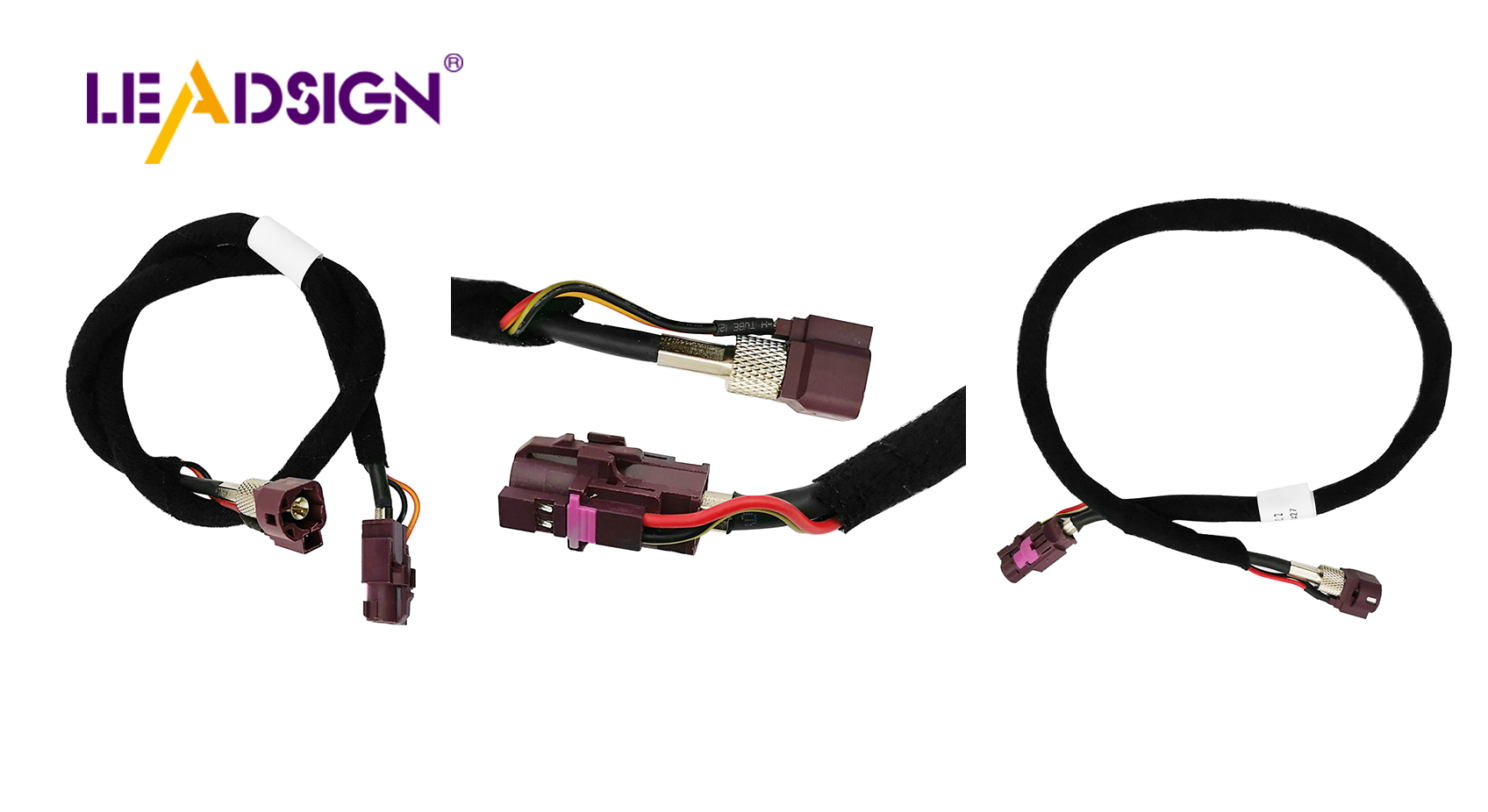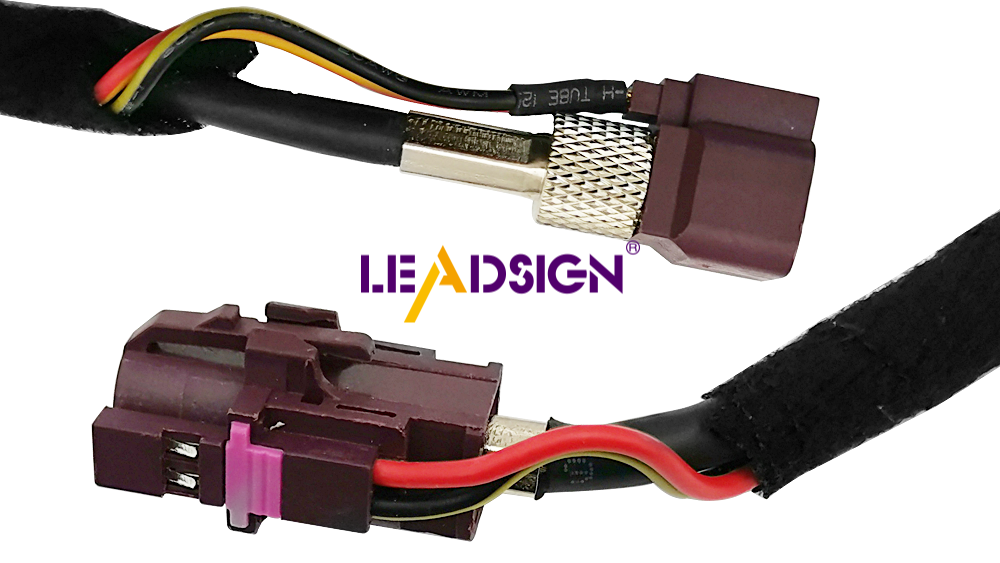A Beginner's Guide to Automotive Harness Connectors

Choosing the right auto harness connectors is essential for keeping your car safe. These connectors must effectively manage electricity, including current and voltage, to function properly. Using incorrect connectors can result in rust, weak signals, or damage. Quality auto harness connectors are designed to endure harsh conditions and perform reliably under pressure.
Key Takeaways
Pick connectors that match their voltage and current limits. This keeps them safe and working well. Ignoring limits can cause overheating or harm.
Use the American Wire Gauge (AWG) system to choose wire size. Right wire size stops overheating and keeps signals strong. Match wires to connector limits for best results.
Think about dirt and water when choosing connectors. Check IP ratings to see if they handle tough conditions.
Understanding Electrical Requirements
Voltage and Current Ratings
Picking the right connectors means knowing voltage and current limits. These limits show how much electricity a connector can safely handle. Ignoring them can cause overheating, damage, or even danger.
Here are the main ratings to remember:
Rated Current: The highest current a connector can handle safely. Going over this can cause heat and shorten its life.
Operating Voltage: The usual voltage the connector handles during normal use.
Withstand Voltage: The top voltage the connector can briefly handle without breaking.
Connectors must fit your system's current and voltage needs. Too much current raises resistance, causing wear and voltage drops. Too much voltage can lead to sparks or system issues, which might be unsafe.
Wire Size and Signal Compatibility
The right wire size is key to avoiding overheating and signal problems. The American Wire Gauge (AWG) system helps pick wires based on current and length.
For example, an 8 AWG wire works for 0-60 amps under 5 feet. For longer distances or higher currents, use thicker wires like 4 AWG. This prevents overheating and keeps signals strong.
Matching wire size to connectors is important. A bad match can hurt performance or damage your system. Always check the wire's capacity against the load to stay safe.
Environmental Factors for Auto Harness Connectors

Sealing and IP Ratings
When picking connectors, think about dirt, water, and chemicals. IP ratings help you know how well connectors handle these. These ratings show protection levels against solids and liquids.
Here are some common IP ratings:
IP67: Fully blocks dust and handles short water submersion.
IP69K: Protects even more, including high-pressure water sprays.
The first number in an IP rating shows solid protection. The second number tells how well it resists liquids. For example, IP67 connectors keep dust and water out, even in tough spots.
Sealing is also important. Many connectors use rubber seals to block dust and water. These seals protect parts so they work well in harsh places. By stopping dust and water, seals help connectors last longer.
Material Durability in Harsh Environments
Connector materials decide how they handle tough conditions. They face heat, chemicals, and stress. Nylon and PBT are common materials. Nylon resists car fluids, while PBT blocks moisture, dust, and chemicals.
Connector contacts are often made of metals like gold- or tin-plated brass. These metals resist rust and conduct electricity well.
Heat can make materials expand or shrink, causing stress. Chemicals can damage materials, making them wear out faster. Strong materials ensure connectors last and work well, even in hard conditions.
Addressing Size and Space Constraints
Compact Designs for Tight Spaces
Modern cars have less room for electrical parts. Small connectors fit tight spaces without losing performance. These designs save space and improve efficiency in crowded systems. But making small connectors can be tricky.
Design Factor | What It Means |
|---|---|
Easier to connect and reliable but less strong. | |
Signal Issues | Small designs may cause interference with fast signals. |
Strong Build | Must resist water and shaking to meet car standards. |
Smart Layouts | Staggered circuits save space while working well. |
Precise Manufacturing | Automated tools make tiny designs accurate and high-quality. |
Early Planning | Working with experts early avoids problems and improves design. |
Think about these points when picking small connectors for your car. Talking to experts early can help avoid mistakes and improve results.
Balancing Small Size with Good Performance
Smaller connectors are useful but bring challenges too. Tiny pins make it hard to balance size and function. Close signals can interfere with each other. Strong designs are needed to handle water and shaking.
Choosing the right materials is very important. Thin materials might break under pressure. Weak spots in thin walls can fail when stressed. You also need to balance insulation, strength, and how easy it is to make.
New ideas help small connectors work well. Special plastics stay strong and keep their shape. Digital tools test designs and give quick feedback. AI and machine learning pick better materials and speed up work. Getting experts involved early makes designs simpler and saves money.
By solving these problems, small connectors can stay strong and work well in tight spaces.
Ensuring Reliability and Durability
How Long Connectors Last
Think about how often a connector will be used. This is called mating cycles. Each time you plug or unplug, the connector wears out a little. Over time, this wear can make it less effective at carrying electricity.
Different connectors last for different amounts of use:
Tin-plated ones work for 10 to 50 uses.
Gold-plated ones can handle 500 or more uses.
USB connectors are made for thousands of uses.
FFC and FPC connectors are better for fewer uses.
To make sure they last, pick connectors made from strong materials. Tests like MIL-DTL-38999 check how well connectors handle repeated use. These tests help you choose the right one for your needs.
Working in Tough Conditions
Car connectors face hard conditions. They deal with heat, cold, shaking, and chemicals. Common problems include:
Extreme heat or cold, which can crack or stretch materials.
Shaking or bumps, which can loosen parts or cause damage.
Rust from wet or salty air, which can ruin connectors over time.
Tests make sure connectors work in these tough spots. For example:
Test Name | What It Checks |
|---|---|
Handles contact with fluids. | |
EIA-364-17 | Works in very high heat. |
EIA-364-26 | Resists rust in salty air. |
EIA-364-32 | Survives quick temperature changes. |
By picking connectors tested for these things, you know they’ll work well, even in harsh places.
Termination Types and Picking a Connector
Solder vs. Crimp Terminations
When picking a termination type, you’ll choose solder or crimp. Both have pros and cons based on your needs.
Solder | Crimp |
|---|---|
Blocks moisture and keeps out dirt. | Strong and lasts a long time. |
Makes reliable connections. | Easy and quick to install. |
Transfers electricity well. | Handles shaking without breaking. |
Won’t rust easily. | Works well if crimped correctly. |
Takes time and skill to do. | Needs special tools to crimp. |
Heat can harm parts. | Hard to reuse after crimping. |
Soldering gives a strong, lasting bond with good conductivity. But it takes skill and can harm heat-sensitive parts. Crimping is faster and resists shaking but needs the right tools and care. Think about these points when deciding.
Matching Your Wiring System
Your connector must fit your car’s wiring system. Using the wrong one can be dangerous.
Old or salvaged connectors might not work well. They often lack the quality of original parts, causing problems.
Bad connectors can harm systems like airbags or brakes. This could be very dangerous in an accident. Salvaged connectors may also fail safety rules, leading to trouble. Always check that your connector fits your wiring system to stay safe and avoid issues.
Tips for Picking the Right Connector
Focus on Key Features for Your Needs
Picking the right connectors for your car needs careful thought. First, check the current and voltage ratings. These make sure the connector can handle electricity safely. If your system needs many connections, choose connectors with more contacts. This keeps signals strong and allows for future upgrades.
Think about the environment too. If your system faces heat, water, or dirt, pick connectors with good IP ratings. For example, IP67 connectors block dust and water well. Strong locking parts are also important. They help connectors stay secure during bumps and shakes in cars.
The material of the connector matters a lot. Good materials like copper or brass last longer and conduct electricity better. Sealed connectors keep out water and dirt but are harder to fix. Unsealed ones are easier to maintain but less protected. Always buy from trusted brands for safety and quality.
Feature | What It Does |
|---|---|
Current rating | Makes sure connectors handle system current safely. |
Voltage rating | Prevents sparks and damage by matching the system voltage. |
Number of contacts | Supports strong signals and allows for future system changes. |
Environmental Conditions | Protects against heat, dirt, and water with proper IP ratings. |
Mechanical factors | Keeps connectors secure during movement and shaking. |
Ask Experts for Better Choices
Talking to experts can help you pick the best connectors. They know which features matter most for your system. For example, they might suggest connectors for high-power brakes or electric car systems. They can also help balance small size with good performance.
Experts use special tools to study your system. They check things like signal strength, material quality, and connection types. For instance, they may recommend soldered connectors for better electricity flow or crimped ones for quick setup. They also look at the environment to suggest sealed or unsealed connectors.
Experts also solve compatibility problems. They make sure your connectors work with your car's wiring. This avoids mistakes and ensures everything works well for a long time. By working with professionals, you get custom solutions that make your car safer and more efficient.
Tip: Contact manufacturers or experts early in your project. Their advice can make choosing connectors easier and improve your system’s performance.
Picking the right car harness connectors keeps your vehicle safe. Check for features like shaking resistance, heat handling, and water protection. Good connectors last longer, prevent problems, and save money on repairs. Talk to experts to find the best options. Make sure your connectors work well now and in the future.
FAQ
What do automotive harness connectors do?
These connectors join electrical parts in your car. They help send power and signals safely to systems like lights, sensors, and radios.
How can I tell if a connector is waterproof?
Look at the IP rating. For instance, IP67 connectors block dust and handle short water dips. Rubber seals also help keep out moisture.
Is it safe to reuse connectors from another car?
Reusing old connectors can be unsafe. They might not fit or meet safety rules. Always pick new, good-quality connectors for better safety and performance.
Tip: Ask an expert to check if connectors will work before buying.
See Also
Understanding HSD Connectors Within The Auto Sector
An In-Depth Overview Of HSD Connectors
Navigating Ford Fakra Connectors: A Complete Guide

